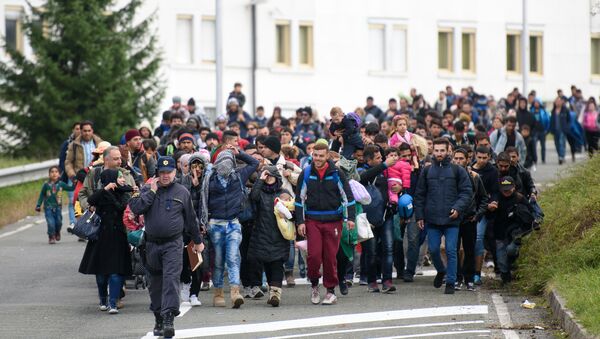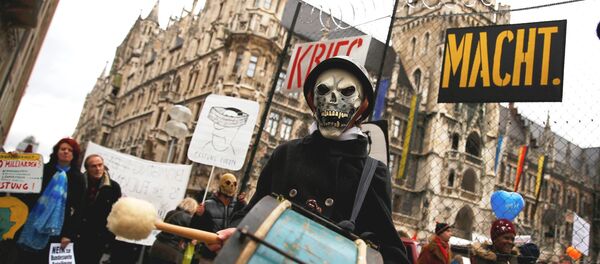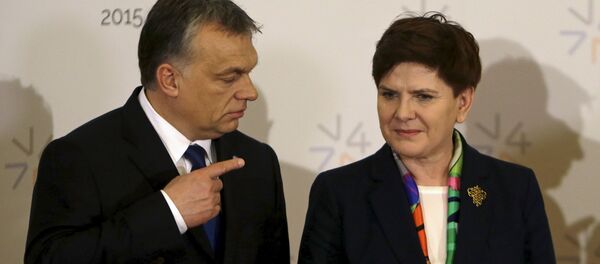The European migrant crisis escalated in 2015 when Merkel said Germany would offer asylum to refugees — declaring her country's doors open to them. This precipitated a huge movement of people from refugee camps in and around Syria and Iraq.
To begin with, Merkel's declaration was seen as a generous display of humanitarianism at home, but not abroad. After hundreds died attempting to escape war zones in Syria, Iraq, Afghanistan, Libya and other parts of North Africa via the Mediterranean — putting Greece and Italy into crisis — Merkel's call led to the opening up of the so-called West Balkan route.
Hundreds of thousands of migrant began crossing from Syria, through Turkey and into Europe, causing chaos. Hungary, Austria, Greece, Bulgaria, Macedonia, Slovakia, Norway, Finland, Italy, Sweden, Denmark and even Germany all introduced border controls — some temporary, others not — to restrict the tide of migrants.
As the Schengen zone became embroiled in chaos, Merkel demanded a pan-European response to the crisis: a mandatory relocation of refugees — initially out of Greece and Italy which bore the original brunt of the diaspora. However, her demands were shunned — particularly by Poland, Hungary, Slovakia and the Czech Republic, among others.
#Visegrad25 pulling EU strings as divisions deepen within Europe https://t.co/gryxsRDw4K pic.twitter.com/lG8xygM1BC
— Sputnik UK (@SputnikNewsUK) February 17, 2016
Her total failure to gain support for her migrant plan among her European allies was mirrored at home with a collapse in public support for her stance and splits emerging within her party. Her scheme for relocating refugees within German to each federal state put mounting pressure on local administration, leading to calls for a cap on the numbers arriving.
Austria will accept no more than 37,500 refugees in 2016 — FM Kurz https://t.co/7pnbKpMnRK
— Ruptly (@Ruptly) February 9, 2016
She championed the cause of the EU-Turkey refugee agreement, whereby the EU gave Ankara US$3.35 billion to assist it with refugees and to stem the flow going over Turkey's borders. Despite six meeting between Merkel and the Turkish Government there is little to show from the plan, with Ankara moving at snail's pace to control its borders.
Increasing Unpopularity
Politically, at home, she was hugely damaged by a series of attacks on her by the leader of her sister-party, the CSU, Horst Seehofer, whose Bavarian constituents railed against the tide of refugees coming in from Austria. Seehofer publicly humiliated her during a 12-minute dressing-down at his party's annual conference last year.
Austria Foreign minister basically saying: 'we're full, no more refugees. Sorry'
— Kay Burley (@KayBurley) February 12, 2016
Merkel has promised Germans that she will limit the number of refugees coming into the country, but is attempting to do so without the closure of borders — which goes against her belief in the principle of freedom of movement — and by garnering EU agreement for a unified approach to immigration policy. On both counts, she has failed.
Austria — her closest ally — has become the latest country to put controls on its border with Italy, Slovenia and Hungary and the Visegrad Group (the Czech Republic, Hungary, Slovakia and Poland) together with Bulgaria and Macedonia are threatening to put up an 'iron curtain' that would shut Greece out of Schengen.
Merkel's misery is set to continue, with growing unpopularity at home and a failure to win support for her EU refugee policies. With Europe in crisis, the woman placed top on Forbes magazine's list of the 100 Most Powerful Women in the World nine times — including 2015 — now faces political isolation and looks increasingly powerless to deal with the crisis many say is of her own making.




